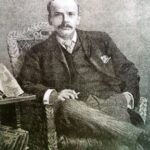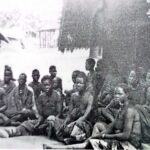BREW, RICHARD
- 2 Min Read
Richard Brew (?- August 5, 1776) was a prominent member of the British trading community on the Gold Coast during the second half of the 17th century, and exercised considerable influence in Fanteland.
Born in Ireland, he spent 30 years in the Gold Coast, returning only once to Europe. He served the Company of Merchants Trading to Africa (the British concern, subsidised by Parliament, which in 1750 superseded the Royal African Company) as a member of the coastal administration. In 1757 he was the first governor to occupy Anomabu fort, newly-built by the company to replace an earlier ruined fort.
In 1764 he resigned from the company’s service and set up as an independent trader at Anomabu in Castle Brew, a large and well-equipped house (since collapsed) which he had built close to the fort. There he traded in gold and slaves, and Castle Brew became the center of an extensive business, financed by his London partner, Samuel Smith, with subsidiary training posts along the coast as far South as the Equator. He was also in partnership for a time (probably from 1763 to about 1767) with William Webster, a governor of Komenda until 1763.
Brew was noted for his close ties with the Fante, particularly the Omanhene (chief) of Anomabu, Eno Baisie (Beesie) Kurentsi ( known to Europeans as “John Currantee”), with whose daughter Brew made a “country” marriage. The Fante Brews, later to be important in coastal affairs, were descended from him.
During a period of disturbed Asante-Fante relations, which began in 1765, Brew had custody of an Asante royal hostage, Osei, whom the Fante had handed over to him. Brew also acted as a mediator between the disputants, sending messengers inland to the Asantehene in Kumase. Hot-tempered and often at odds with the British and Dutch trading companies, he died heavily in debt to European creditors.
MARGARET PRIESTLEY




